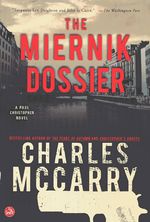The Miernik Dossier
The Miernik Dossier, published by the Saturday Review Press in 1973, was the first of sevens novels by the American novelist Charles McCarry featuring an American intelligence agent named Paul Christopher. Set in 1959 in Europe and Africa during the days of the Cold War, it is narrated in the form of reports, overheard conversations, and various documents from a multitude of sources of different nationalities, supposedly giving the reader an authentic picture of what an actual intelligence operation might be like. McCarry had previously been an undercover operative for the Central Intelligence Agency for nine years, and the book was hailed for its apparent authenticity and realistic depiction of tradecraft. It received excellent reviews, and instantly established McCarry's reputation as one of the foremost American novelists of espionage.
Critical appraisal
Reviewing a non-Christopher novel by McCarry in the New York Times in 1988, John Gross wrote:
Charles McCarry's first novel, The Miernik Dossier, which was published in 1973, is arguably the finest modern American spy story, the only one that matches the leading British masters of the genre in subtlety and ingenuity. It featured an agent called Paul Christopher, and Christopher's adventures form the basis of four subsequent novels by Mr. McCarry, none quite as good as The Miernik Dossier, but all far superior to the average cloak-and-dagger concoction.[1]
At the time of its publication, Newgate Callendar, the weekly mystery reviewer of the New York Times, called it "a fast-moving tale of Byzantine intrigue" and said that Miernik himself was "continuously interesting".[2]
